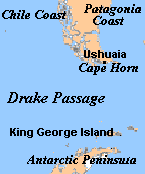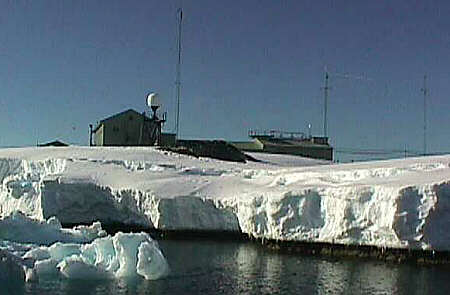 |
|
 click map for more detailed location info |

Vernadsky Base
Report 10 February - Team B on board Pelagic Vernadsky Station
Weds 10th FebMany thanks for the email and words of encouragement from Maidstone Canoe Club. Best wishes go to Trent Sea School, Nick Cutts and all at Standard Life Leicester Office. Received your emails, thank you.
The first night at Vernadsky and a warm welcome by the Ukranians. This ex-british base (Faraday) is a hive of scientific activity. No military input, a refreshing change. Whilst some military support for the scientists can be justified and is sometimes essential it somehow seems out of place when you encounter it in Antartica.
Heather spent time interviewing many of the base scientists. This valuable material may be of great help with the educational project on our return. What really impressed Heather was the famous ozone machine called Daphne, in use since 1957. British scientists used this machine to identify the ozone layer depletion problem and it still continues to scan the skies.
Signing the Vernadsky visitors book on behalf of Mission Antarctica, Heather was delighted to discover the names on the previous day's page of James Ross and his wife Sara. James is the great, great grandson of the Scottish naval captain and explorer, Sir James Clark Ross who discovered the Ross Sea and went the furthest south than anyone ever before. James and Sara were accompanied by the daughter and grandchildren of James Wordie, Shackleton's scientific officer and tutor to Sir Vivian Fuchs.
Wordie's contribution to Antarctica's history lives on. A short zodiac trip to Winter Island finds the original preserved scientific base, bearing his name, Wordie House, the predecessor of Faraday. A wonderful museum which backs up as emergency accommodation should a disaster occur at Vernadsky. A tattered Union Jack flys high over this remote building. Open its doors and you are transported back to the 1950s - Pearce Duff baking soda, Marmite tins and other artefacts lying on shelves. Diaries found open on the commander's desk recounting survival stories: July 1957 'we killed a seal today, just short of the island. We ate its liver and kidneys for supper. Temperature was - 23degrees fahrenheit'.
This deserted hut was left as though you'd expect the former inhabitants to return at any moment. A roar of laughter came from the rest of the crew when I revealed some of the equipment used by the polar men was the same kit I had used in the Arctic as a young sailor. I was slightly miffed to find it in a museum already. We shall witness a video showing some of the more bizarre activities here, tonight. A collection of footage including the post sauna dash into the frozen ocean followed by a vodka slammer will not be for the fainthearted.
Adrian Cross
| Weather and Position Data | |||
| 1. Date | 2. Time | 3. Posn Lat | 4. Posn Long |
| 10/02 | 10.08 local | 65°-14.922S | 64°-15.192W |
| 5. Compass Heading | 6. Wind Speed | 7. Boat speed | 8. Wind Dir |
| 262° | 4 Knots | 0 Knots | 30° |
| 9. Pressure | 10. Air Temp | 11. Sea Temp | 12. Cloud Type |
| 996 | +4°C | no data | cumulus |
| 13. Cloud cover | 14. Precipitation | 15. Sea State | 16.Comments |
| 100% | none | calm | windchill+2°C |